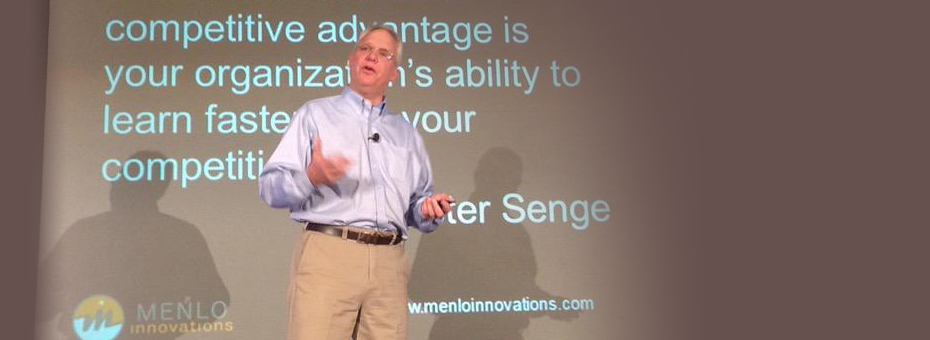Lean community… we need to talk. Seriously, let’s have your people contact my people. We really do need to talk.
Perhaps, the unfortunate consequence of Womack, Jones and Roos’ book, The Machine That Changed the World, is that some might conclude from the title that the change is done. (The Machine that is Changing the World might be a good next edition, Jim).
Since it’s original writing in 1990, the world of work itself has changed. And the most significant change might be summed up in a single word: software. Think about it: how many of us remember film? Newspapers? Travel agents? Land lines? The Readers Guide to Periodical Literature? Video stores? Maps? TripTiks from AAA?
What will be on this list in another 25 years? Letter carriers, credit cards, wallets, driving your own car?
There is no longer a company in existence that can survive without software. And most companies aren’t good at it. As recently demonstrated, Starbucks can’t even sell coffee without software. Their April 2015 point of sale system outage forced them to give away coffee on a Friday afternoon for 3 hours costing them millions in lost revenue.
This software thing is a problem, and a big one. Every major corporation is trapped by the software dilemma. Damned if you do, out of business if you don’t. Pick up a copy of The Wall Street Journal (all right, there are still real newspapers) and see if you can even get past page 1 before you learn of another software catastrophe within a major corporation, or the government. I used to have to over explain this point until Healthcare.gov came along and even the current administration was caught in the chaos of the software game. The President had to talk to the nation about bugs and glitches, missed deadlines, horrible project management, gaping security holes, and outlandishly poor performance. I never thought I’d see it, but we were having a national conversation about improving process design!
The last place my industry reaches for help is the stodgy, rusting, old manufacturing sector. I mean, we are the future, the software industry! We don’t need no stinkin’ manufacturing types to teach us a thing or two about systems thinking, operational excellence, quality, capacity planning, lightweight process, human energy, teamwork, trust, collaboration, and continuous improvement! (Do we?)
Yes we do. Some of the problems we can discuss are familiar to the lean community:
- Towers of knowledge that become bottlenecks of productivity and prevent scaling.
- Lack of tangible capacity planning capability which results in death march cultures, employee burnout, and the quality problems that are a natural consequence.
- Ineffective practices that operate without rigor and discipline leaving our companies vulnerable to all forms of software chaos.
- Ineffective conversations across divisions within companies: Finance, Marketing, Sales, Production, and R&D don’t see each other as partners but adversaries.
- And so much of the effort needed is not about process or tools, but first about culture and attitude. It’s about building trust, collaboration and safety.
That’s the thing. Learning from manufacturing might be one of the smartest things we can do. Our industry is still a fledgling industry. We are still in our youth. We are Detroit, circa 1950: proud, wealthy, solid, undefeated, on top of the world. No one can beat us at our game. We are the best and always will be.
There are some crazies in our industry who believe we need to improve things. We call ourselves the agile community. We talk about new methods, new process, new approaches. And big industry still largely thinks we are cute. Probably the way Detroit thought about quality guru W. Edwards Deming in 1950.
Wherever you place yourself, the software community needs to up its game. We need an order of magnitude improvement. The future of human civilization may depend on it. I know that sounds like hyperbole, but I’m not sure anyone can know just how important software quality and security can be until something really bad happens.
As for me, I also want to move this big conversation towards joy. The joy of creating software that delights users, that works without error, that is secure and scalable. And the joy of collaboration because improving software design, systems, and processes to consistently create real value will be a ton of hard work, the kind of work that the lean community knows how to do, and that the agile community is geared and motivated to do.
This is the real reason we need to talk: we simply need each other. The direction industry is headed is that very few manufactured products don’t include software. Imagine a car without software, an airplane, a medical device, a phone, or a kitchen appliance. And the software community needs lean know-how.
So let’s talk. My people will call your people. We are on the verge of an exciting new frontier. Let’s get going.



